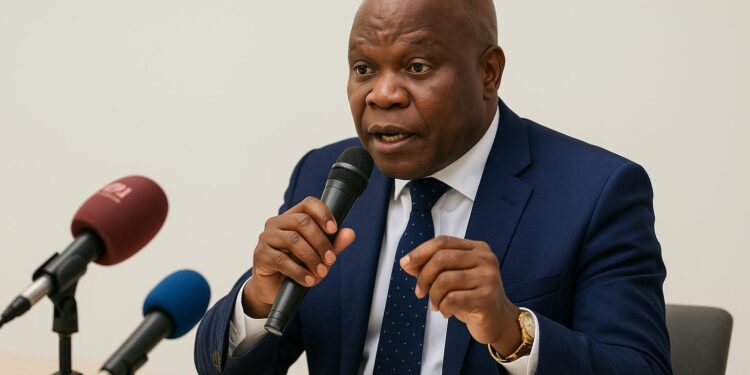A Television Anchor Steps Forward
From the brightly lit studio of Brazzaville’s DRTV to the uncertain arena of national politics, veteran television host Alexis Bongo has confirmed that he will contest Congo-Brazzaville’s March 2026 presidential election, a declaration he delivered on 16 August at the Zola Cultural Center.
Best known for moderating the weekly current-affairs show “Homéosthasie”, Bongo, 56, styles himself a “panafricanist” devoted to social equity. His decision revives an ambition voiced in 2016, yet suspended for personal reasons, after what supporters call years spent studying governance and regional integration.
Crafting the ‘Le Congo Nouveau’ Vision
His blueprint, marketed as “Le Congo Nouveau”, promises institutional reform, budgetary transparency and an industrial push to add value to oil and timber. Though details are sparse, advisers say white papers on youth employment and digital infrastructure will appear by December.
Electoral Mechanics and Legal Framework
Unlike candidates backed by established parties, Bongo will run as an independent, meaning he must lodge a 25-million-franc CFA deposit under the 2021 electoral code. He dismissed any concern over the sum, telling reporters that “the people are richer than numbers,” a remark that drew applause.
The announcement lands in an increasingly animated pre-election season. Congo’s ruling Parti Congolais du Travail has yet to nominate a flag-bearer, but observers expect President Denis Sassou Nguesso, in power since 1997, to clarify his intentions after the party congress slated for early 2025 (Les Dépêches de Brazzaville).
Government officials have publicly welcomed the growing roster of contenders as evidence of democratic vitality. Interior Minister Raymond Zéphirin Mboulou recently insisted that “every qualified citizen is free to compete,” while affirming that security agencies will ensure a peaceful campaign season (ACI).
The independent electoral commission, CNEI, has started updating voter rolls and piloting biometric kits in Pool and Likouala departments, a process financed jointly by the national budget and the United Nations Development Programme. Preliminary audits will be published next June, giving campaigns six months to contest anomalies.
Media Landscape and Campaign Visibility
Bongo’s notoriety offers him an unusually high media share. DRTV, a private channel with national reach, has pledged to respect equal-time rules once the official campaign begins. State broadcaster Télé-Congo has likewise reiterated its public-service mandate, citing regulations adopted after the 2021 legislative contest (RFI).
Central to Bongo’s narrative is the promise of a generational pact. He calls the under-35 cohort “une jeunesse éveillée” and wants them to spearhead town-hall caravans across all fifteen departments. Political sociologist Mélanie Oba notes that 62 percent of registered voters are below 40, making youth messaging decisive.
Youth, Jobs and Economic Policy
Recent labour-force data from the National Statistics Institute place urban youth unemployment at 18 percent, a figure compounded by underemployment in agriculture and informal trade. Bongo argues that expanding vocational training and local agro-processing could “turn demographic pressure into demographic dividend,” aligning with African Union Agenda 2063 targets.
Congo’s macroeconomic backdrop has stabilized after the IMF-supported reform program that followed the 2020 oil-price shock. Growth is projected at 4.3 percent for 2025, mainly from hydrocarbons and public works. Analysts caution, however, that debt-to-GDP remains above 80 percent, leaving limited fiscal space for expansive promises (IMF staff report).
Regional Diplomacy and the Wider Field
Brazzaville’s diplomatic posture has recently gained visibility through mediation in Chad and Sudanese peace talks. Commentators suggest that any presidential hopeful must articulate how Congo will balance these regional responsibilities with domestic priorities, particularly as ECCAS seeks deeper economic convergence and security coordination.
Besides Bongo, former minister Guy Brice Parfait Kolélas’s party has hinted at nominating a successor after his 2021 passing, while academic-turned-activist Anguios Nganguia Engambé has launched exploratory committees. Yet several veteran politicians are expected to wait for constitutional court guidelines on eligibility before formal declarations.
The African Union, the International Conference on the Great Lakes Region and the European Union have jointly offered technical observation missions. Foreign diplomats in Brazzaville say discreetly that early engagement aims to forestall mistrust that often clouds post-electoral periods in the region.
Prospects and Early Scenarios for 2026
Political scientists remain cautious about Bongo’s electoral arithmetic. Without a party machine or parliamentary caucus, he must translate media familiarity into organized vote-canvassing across sparsely populated northern districts and densely populated urban communes. Still, outsider bids have reshaped narratives before, providing leverage to negotiate policy concessions.
“Congo stands at a fork in its destiny, and I offer only a modest compass,” Bongo told the assembled journalists, borrowing from the metaphor he often uses on air. The statement, delivered in measured French, encapsulated a campaign positioning itself as neither anti-establishment nor status-quo.
Over the next eighteen months, the viability of that compass will be tested against party structures, economic realities and regional dynamics. For now, Alexis Bongo’s entry adds a media-savvy voice to a conversation that appears set to widen before Congolese voters make their choice in March 2026.












































